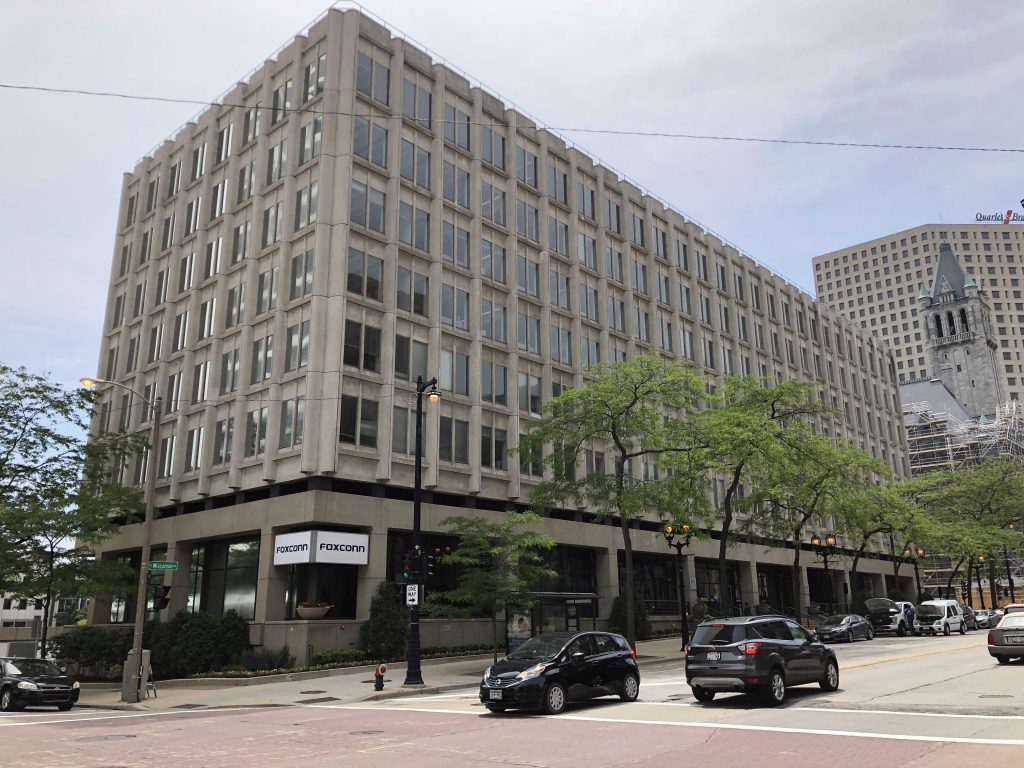Foxconn UW Funding Good News
State needs more research and development at flagship university.
Instead of the usual invective and low-balls that normally get slung about in the name of campaigning for Wisconsin governor, what would happen if the discourse was elevated to the place where issues that mattered for the well-being of citizens, and the long-term interests of the state took place?
Over this long weekend of too much rain I found my reading often took me in a path towards issues dealing with the future needs of our state.
No one could find reason not to smile and be glad about the news last week concerning Foxconn Technology Group investing $100 million in engineering and innovation research at the University of Wisconsin–Madison.
The Foxconn Institute for Research in Science and Technology will provide funding on practical topics and capabilities in core areas that will become increasingly invaluable to the advanced technology hub, along with the artificial intelligence, 8K resolution and 5G wireless technology ecosystem that we are building in Wisconsin.
There is no doubt that the economic stimulation resulting from Foxconn is being felt, and roots are taking hold in small ways that will prove to be very beneficial to this state and region. Research and development on a whole array of new technology horizons is exactly the path our state needs to take. We can, and must, reverse the image of Wisconsin as a graying older state and seek to attract young minds who will be the innovators of ideas and products we can not now envision.
To allow for cutting-edge concepts to be discovered and then crafted into business designs means new and deeper wells of funding will be required. Tom Still, President of the Wisconsin Technology Council, is perhaps the most persistent advocate of venture capital. He weighed in, once again, to make his case.
Chris Rizik, the managing director of the Renaissance Fund, described the fund’s structure, investment experience and results in early 2017 at the invitation of the Wisconsin Technology Council. He described Wisconsin as “poised” for such a fund. The Tech Council most recently cited the benefits of such a fund with the release of its 2018 white-papers report, “Pathways to Success.”
“We have 1.78 percent of the nation’s population, conduct 1.89 percent of the nation’s academic research and generated 1.64 percent of the nation’s patents,” the report reads. “However, we have 0.21 percent of the nation’s venture capital under management and our state’s companies raised 0.35 percent of our nation’s venture capital.”
Wisconsin has a cadre of major companies. It has experienced investors in angel capital networks and stand-alone funds. Increasingly, it has the right talent and ideas.
What’s needed now is a shared sense of opportunity about reinvesting in Wisconsin and a few corporate champions to take up the challenge. The potential is there.
What concerns me is that when the best minds and most hopeful citizens press for a better way forward in Wisconsin, other voices louder and more shrill get the large headlines. And we can not deny that a large segment of the populace are swayed to believe in views that run counter to our best interests. That point was made in The Economist this week.
Rising anti-immigrant sentiment and tighter visa regimes of the sort introduced by President Donald Trump have economy-wide effects: foreign entrepreneurs create around 25% of new companies in America. Silicon Valley first bloomed, in large part, because of government largesse. But state spending on public universities throughout America and Europe has fallen since the financial crisis of 2007-08. Funding for basic research is inadequate—America’s federal-government spending on R&D was 0.6% of GDP in 2015, a third of what it was in 1964—and heading in the wrong direction.
We need to think about where our state is headed. And I do not mean in a Blue or Red direction. But instead either forward or backwards–up or down.
We need to embrace private-public partnerships that push the boundaries of new technology and ideas. We should thrill at educational and business relationships that will not only create jobs but allow for young minds in far-off places to want to live, study, and work in Wisconsin. We need to find and promote funding sources that are understood to be wise investments for tomorrow.
I am hoping that in the weeks ahead, as Labor Day is over, and the fall gubernatorial campaign continues, that a reasoned and meaningful discussion can take place in Wisconsin about where we are headed and what we desire for our future. If we only concentrate on a partisan outcome we will have missed a moment to have a public conversation we all need to have.
Gregory Humphrey writes for the Caffeinated Politics blog
More about the Foxconn Facility
- Foxconn Paid Mount Pleasant $15 Million Make-Up Fee in 2025 - Steph Conquest-Ware - Jan 6th, 2026
- Murphy’s Law: Total Cost of Foxconn Is Rising - Bruce Murphy - Dec 8th, 2025
- WEDC, Foxconn announce additional $569 million investment in Racine County - Wisconsin Economic Development Corporation - Nov 25th, 2025
- Foxconn Acquires 20 More Acres in Mount Pleasant, But For What? - Joe Schulz - Jan 7th, 2025
- Murphy’s Law: What Are Foxconn’s Employees Doing? - Bruce Murphy - Dec 17th, 2024
- With 1,114 Employees, Foxconn Earns $9 Million in Tax Credits - Joe Schulz - Dec 13th, 2024
- Mount Pleasant, Racine in Legal Battle Over Water After Foxconn Failure - Evan Casey - Sep 18th, 2024
- Biden Hails ‘Transformative’ Microsoft Project in Mount Pleasant - Sophie Bolich - May 8th, 2024
- Microsoft’s Wisconsin Data Center Now A $3.3 Billion Project - Jeramey Jannene - May 8th, 2024
- We Energies Will Spend $335 Million on Microsoft Development - Evan Casey - Mar 6th, 2024
Read more about Foxconn Facility here
Op-Ed
-
Wisconsin Candidates Decry Money in Politics, Plan to Raise Tons of It
 Dec 15th, 2025 by Ruth Conniff
Dec 15th, 2025 by Ruth Conniff
-
Trump Left Contraceptives to Rot; Women Pay the Price
 Dec 8th, 2025 by Dr. Shefaali Sharma
Dec 8th, 2025 by Dr. Shefaali Sharma
-
Why the Common Council’s Amended Budget is Good Policy for Milwaukee
 Nov 20th, 2025 by Alds. Marina Dimitrijevic and Russell W. Stamper, II
Nov 20th, 2025 by Alds. Marina Dimitrijevic and Russell W. Stamper, II





















